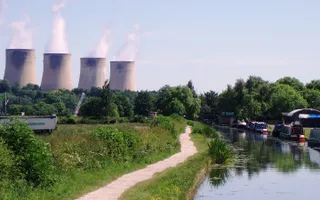NSIPs are major proposals relating to energy, transport, water, waste and waste water. For NSIPs to go ahead they need a development consent order (DCO). The process for making DCOs was established by the Planning Act 2008 and amended by the Localism Act 2011. The Planning Inspectorate carries out many aspects of the process on behalf of the relevant Secretary of State. There are opportunities for people and organisations to be involved before the relevant Secretary of State decides whether or not to make a DCO.
NSIPs and other infrastructure projects
We are involved in consultations on the development of Nationally Significant Infrastructure Projects (NSIPs) that affect our waterways.

We're involved in the DCO process as a prescribed consultee on NSIP proposals which are likely to have an impact on inland waterways or land adjacent to inland waterways. This is set out in Schedule 1 of the Infrastructure Planning (Interested Parties and Miscellaneous Prescribed Provisions) Regulations 2015. It means both promoters of NSIPs and the Planning Inspectorate are required to consult us at various stages of the process. We may also be involved as an affected landowner. Please contact us if you need to.
We have a list of current and recently decided NSIPs relevant to us.
Pre-application consultation is a key part of the DCO process. Under s42 of the Planning Act 2008 there is a requirement to undertake pre-application consultation with prescribed consultees. So, if you're an NSIP promoter please contact us early. You might also find our “what we're interested in” section useful.
As part of the NSIP process, local authorities need to produce a Local Impact Report, which the Secretary of State must have regard to when deciding whether to make a DCO. Local authorities don't need to carry out community consultation when preparing their local impact report. If you're a local authority preparing your report and you need to clarify local data you hold in relation to our waterways please contact us.
The Planning Inspectorate website on National Infrastructure Planning gives details of the National Policy Statements used to guide decision making on NSIPs. They contain some general policies for assessing likely impacts. There are a number of topics that are likely to relate to our interests.
Acts of Parliament
An Act of Parliament can be made for certain works of national importance. Examples include the Channel Tunnel Acts passed in the 1970s and 1980s and the Crossrail Act to build a new east to west rail link through central London passed in 2008.
If you're a promoter of a parliamentary bill we actively encourage you to contact us early to ensure that our assets and interests are protected and that any impacts are mitigated.
The building of High Speed Two (HS2) requires an act of parliament for each phase. Phase 1 gained its act of parliament in February 2017. Before permission was granted the phase 1 route was modified after representations from us and the Inland Waterways Association. All phases of the HS2 project affect our waterway network.
Transport and Work Act Orders
A Transport and Work Act Order (TWA) is a statutory instrument made under the Transport and Works Act 1992 to authorise the construction and operation of new transport infrastructure projects, such as railways, tramways, other guided transport systems, inland waterways and works interfering with the rights of navigation.
It applies to projects not defined as NSIPs in the Planning Act 2008 and to projects not requiring an act of parliament.
If you're a promoter of a TWAO we actively encourage you to contact us early to ensure that our assets and interests are protected and that any impacts are mitigated.
You can see the list of current projects relevant to us.
Last Edited: 19 November 2020


Stay connected
Sign up to our newsletter and discover how we protect canals and help nature thrive

